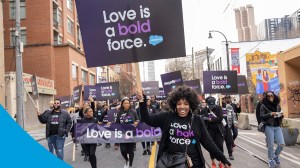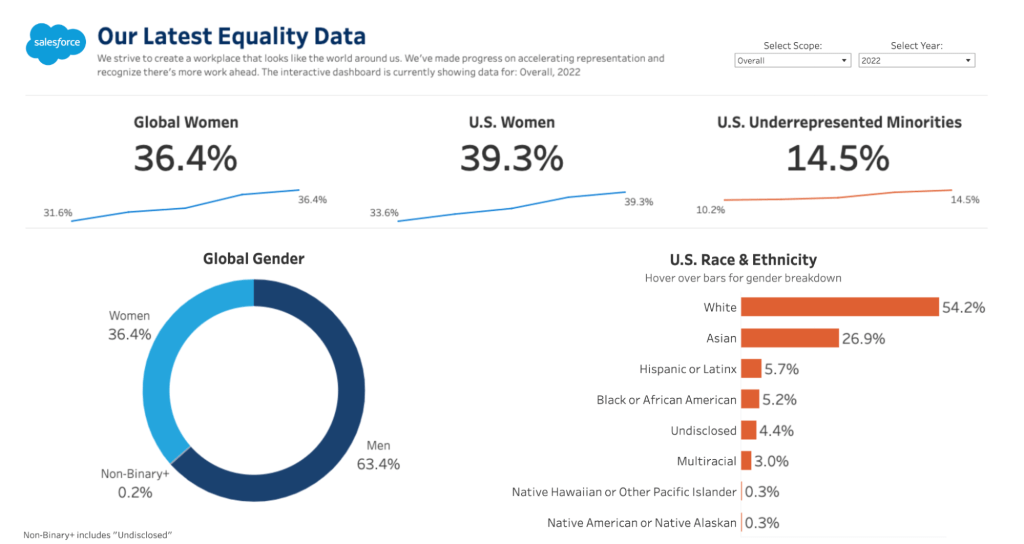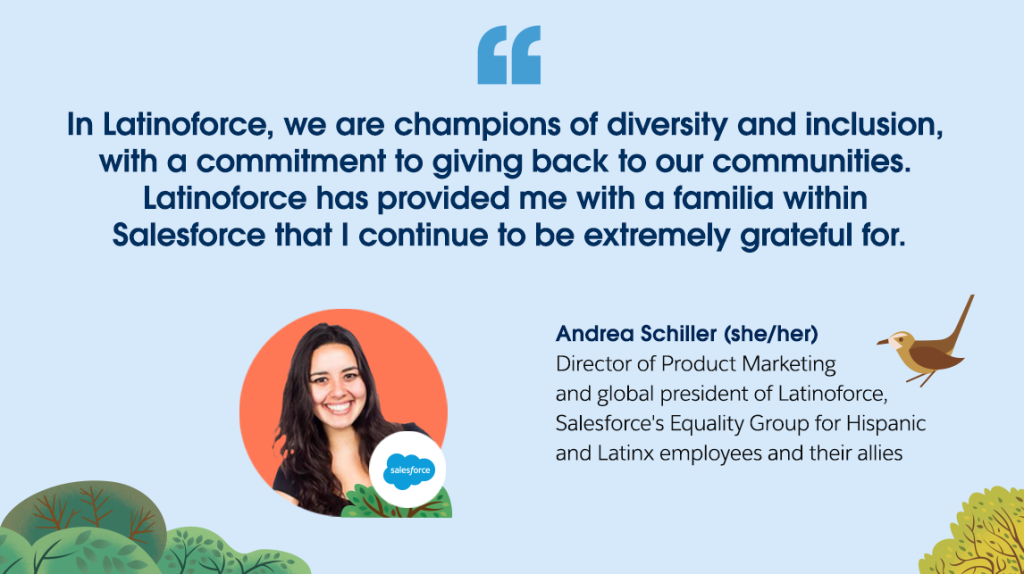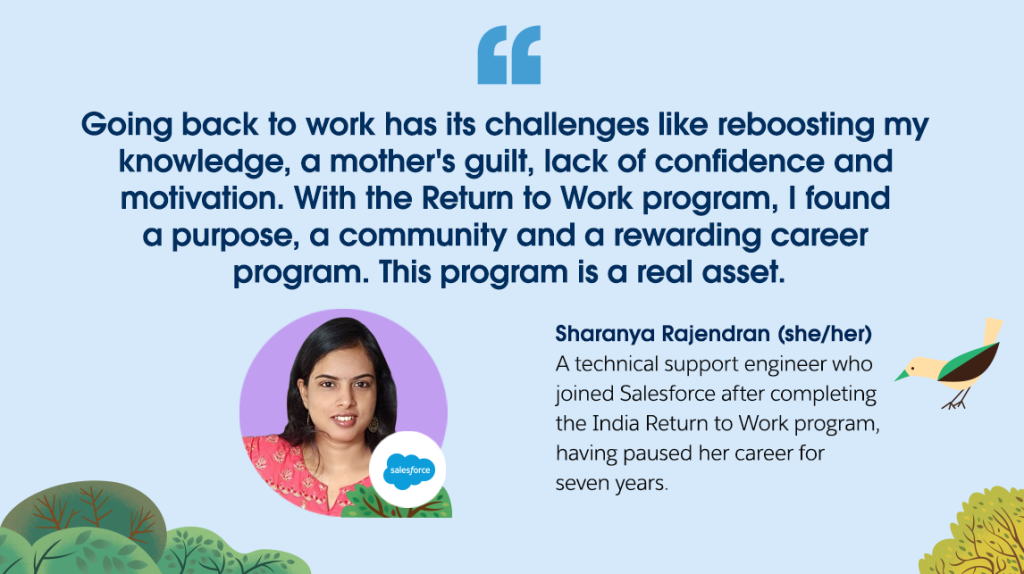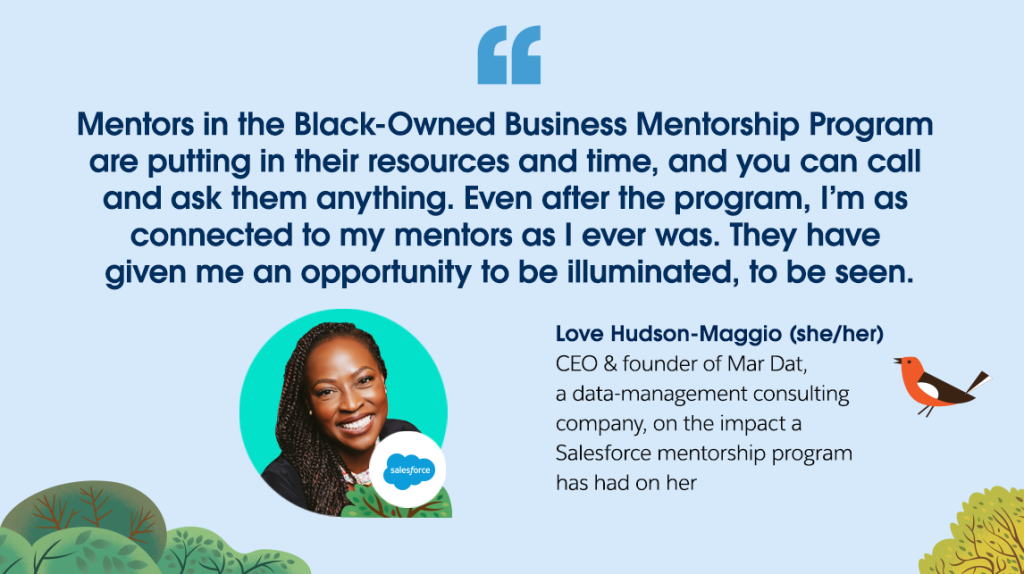Editor’s note: Data is based on 2022 operations for Salesforce (fiscal year February 1, 2022—January 31, 2023)
Equality is a part of who we are at Salesforce. Our commitment to equality is embedded across our business and is reflected in the decisions and actions we take as a company. Especially in challenging times, this commitment does not waver.
We continue to advance representation and inclusion at our company, building meaningful employee experiences and expanding programs that foster greater belonging and help grow careers.
And we help our customers, partners, and Trailblazers drive greater equality and boost business value in the process, exponentially increasing our impact. Through our Racial Equality and Justice Task Force we are supporting societal change and building more resilient businesses and communities, through our philanthropic, purchasing, and policy efforts.
While we have more work to do on our journey to becoming the most inclusive company, we made considerable progress last year.
Table of Contents
- Engaging all of our stakeholders
- Progress on representation
- Meaningful people experiences
- Racial Equality and Justice commitments
Engaging all of our stakeholders
Salesforce has an unparalleled ecosystem, with hundreds of thousands of customers and partners and millions of Trailblazers building their companies on our platform. We know advancing equality takes all of us, so we’re partnering with our ecosystem to design better diversity, equity, and inclusion (DEI) strategies and build more diverse workforces.
We regularly engage with customers to share our equality strategies and offer insights into their DEI journeys. And our partners play a critical role in progress on equality and customer success: They are involved in 70% of Salesforce deals and are multiplying that impact through programs like the Salesforce Talent Alliance and Impact Accelerator. Here’s more on our ecosystem:
- Salesforce published its first ever Partner Ecosystem Equality Report, which describes the critical role our ecosystem of over 11,000 partners plays in driving toward our diversity, equity, and inclusion goals.
- This year, Salesforce launched the Partner Collective Impact initiative, showcasing companies and individuals in the Salesforce ecosystem taking action to positively impact change. Salesforce partner companies can take the pledge here.
- We partner with Historically Black Colleges and Universities (HBCUs) by providing internship and career opportunities for students. We also help accelerate HBCU digital transformations with pro bono resources. Through our HBCU360 initiative, we’ve activated partnerships with 20 HBCUs.
- Our strategic business development team works closely with small- and medium-sized businesses through events such as the National Black Business Month Block Party and the #WeAllGrow Latina organization’s Las Founders Summit to support networking and community-building with hundreds of Black, Hispanic, and Latinx business leaders in person, and millions more who are connected virtually.
- Our Office of Ethical and Humane Use focuses on the ethical and inclusive design, development, and use of technology to ensure Salesforce products are created and used in ways that prevent harm and unlock human potential. This month, the office added new pronoun and gender-identity fields in Salesforce products to increase customer data accuracy and drive greater inclusion.
- Our Office of Accessibility, in partnership with our Abilityforce Equality Group, works to improve accessibility in our products, processes, and operations. Dreamforce 2022 was a demonstration of this partnership and the most accessible to date, with captioning services in-person and on Salesforce+, sign language interpreters for all keynotes, Disability Etiquette training, and more.
Progress on representation
Our ambitious representation goals continue to drive accountability in our efforts to become a workplace that looks more like society. In 2020, we set ambitious multi-year goals to advance representation in critical areas by the end of 2023. We’ve made great progress and have already hit two goals ahead of plan and last year, added a new gender representation goal:
- More than 50% of our U.S. employees are now made up of underrepresented groups (Women, Black, Latinx, Indigenous, Multiracial, LGBTQ+ employees, People with Disabilities, and Veterans), a goal we reached in early 2022.
- We’ve doubled U.S. representation of Black leaders at the VP level or above, more than a year ahead of schedule.
- We continue to work toward a 50% increase in the U.S. representation of underrepresented minority, or URM, leaders (Black, Indigenous, Latinx, and Multiracial identities) at the VP level or above and a 50% increase in the U.S. representation of URM employees overall.
- We’ve introduced a new multi-year global gender goal to reach 40% women-identifying and non-binary employees globally by the end of 2026.
Each year we also set representation goals tied to our environmental, social, and governance (ESG) priorities. Last year, we began tying a portion of executive compensation to reaching these goals, which focus on driving greater women’s and URM representation.
We continue to see steady gains in representation at our company. See a snapshot below, and dig into the interactive data visualization here.
Last year our Self-ID data — a voluntary way for employees to share demographic information — showed an increase in self-ID among LGBTQ+ employees, from 3.6% to 3.7%, and employees with disabilities, from 3.2% to 3.5%, while self-ID among veterans remained unchanged at 2.2%. We continue to encourage more completions of Self-ID to better inform our programs and strategy.
Meaningful people experiences
For many underrepresented people in tech, opportunities for development and advancement are paramount. Equally important is the need for a deeper sense of belonging and community, and more inclusive environments, teams, and leaders. We are designing inclusive processes and policies to better support and retain our underrepresented employees.
Our Equality Groups, what we call our employee resource groups, are central to community, connection, and belonging at Salesforce. More than 50% of our employees and contingent workers are members and/or allies in at least one Equality Group. And our groups have seen a 20% increase in membership in the past fiscal year. Equality Group members and allies — one of the biggest drivers of volunteer activity at Salesforce — also contributed 303,000 hours of volunteer time off (VTO) to our local communities.
This year, we also launched our 13th Equality Group, Salesforce Parents & Families, to connect Salesforce’s community of parents and offer resources and support. Our interbelief Equality Group, Faithforce, launched a Duos Program, where 400 employees of different faiths were paired to have regular, deep conversations to better understand their differences — many participants noted a deeper sense of empathy after these meetings. And we convened eight Equality Circles with leaders and employees to share, process, and support one another during times of crisis.
As Salesforce continues to grow around the world, we’ve created new leadership positions to further our equality work globally, with a new head of equality strategy in EMEA and APAC who is helping design localized programs and a leader focused on our global gender-inclusion strategy.
As part of our more global focus, we supported Salesforce India’s launch of its Return to Work program, a six-month paid apprenticeship that assists women returning to their careers, and supports them in earning full-time job offers at Salesforce. The pilot cohort of the program supported women with training, coaching, and connection with others on the same path, and the program will continue to expand in the region.
In addition, we’ve introduced and expanded people programs to address the unique experiences across our employee base:
- The Warmline, a program that connects employees to advocates to help with pivotal career moments and conversations, continues to provide employees with support — and delivers strong impact. In a Warmline pilot with account executives in the sales organization, we saw a 33% greater quota attainment compared to AEs who did not participate in the Warmline cohort. These insights help us create better programs and support systems that address the biggest challenges to employees’ abilities to grow and thrive.
- We focus on the intersectional experience as a critical area for accelerating progress on equality. We doubled down on two key initiatives focused on intersectional experience – the Black Women Experience and the Hispanic and Latinx Employee Experience. These programs build greater connection among these underrepresented groups, and offer networking, development, and career growth opportunities throughout the year. We combine these targeted experiences with manager enablement to help leaders better understand the experience of their employees.
- We’ve supported more than half of people leaders through our Microaggressions in the Workplace training since launching the training in April 2022. We’re giving leaders the tools to intervene when they see microaggressions happening — and we’re gearing up to support even more leaders and employees across the company this year.
- Through our Amplify Sponsorship, Career Milestones, Equality Mentorship, and leadership development programs, we continue to offer coaching, peer learning, networking, sponsorship, and leadership opportunities to hundreds of underrepresented employees in multiple regions. Participants in these programs take away actionable steps and relationships to continue to grow and thrive in their careers.
- We continue to focus on equal pay for equal work in our annual pay analysis. In our 2022 analysis, we spent $5.6 million to address any unexplained differences in employee pay globally, and we will conduct our next audit in the coming months.
Racial Equality and Justice commitments
We continue to work to effect systemic change in our communities through the Racial Equality and Justice Task Force, driving inclusive business practices, investing in and empowering minority-led organizations, cultivating partnerships, and advocating for policies for racial equality.
Philanthropy
In 2020, when we launched the task force, we set a goal of investing $200 million and 1 million volunteer hours in racial equality and justice. We’ve made great progress on these goals.
- Salesforce has donated over $128 million and completed over 610,000 employee volunteer hours to support organizations advancing racial equality and justice since June 2020.
- In that time, we’ve also delivered over $3.1 million in pro bono services aligned with Sustainable Development Goal 10: Reduced Inequalities.
- We announced the inaugural cohort of the Salesforce Catalyst Fund, which provides critical, unrestricted capital to nonprofits led by underrepresented leaders that have operating budgets under $2 million and/or are less than 10 years old. The first round of grants, totaling $2 million, supported 20 nonprofits addressing inequities in education, economic opportunity, and racial justice.
Purchasing
We set a goal of committing $100 million to Black-owned businesses and $100 million to URM-founded companies by 2023. We’ve exceeded $100 million of spending with Black-owned businesses. We also grew our annual spend with minority-owned businesses by more than 50%. This marks the second year in a row that we exceeded our goal to increase minority supplier spend by at least 25%.
- We continue to build on this work to drive greater economic equality for Black business owners through our Black-Owned Business Mentorship Program, which kicked off its second cohort in December 2022.
- Through Salesforce Ventures, we have exceeded our original goal of investing more than $100 million in Black and URM-led companies and are on track to increase our overall number of Black and URM founders by more than three times by the end of 2023.
- We also hosted the first-ever Black Venture Institute (BVI) Summit at Salesforce Tower New York. BVI graduates have made more than 300 individual angel investments and evaluated over 1,000 new investment opportunities during the last two years and more than one-third of first-year BVI graduates have progressed into VC roles.
- We continue to help small businesses address critical cash flow challenges through our Net 15 Accelerated Pay Program. More than $300 million in payments have been made since 2021 to the 700 small business suppliers in the program.
Policy
We continue to advocate for police reform, civic engagement, and economic empowerment policies.
- Since the launch of the task force, the Salesforce Government Affairs team has supported more than 50 pieces of state legislation related to our equality work and tracked nearly 300 pieces of legislation. This year, we engaged on the VOTES Act in Massachusetts, which increased access to voting, and two police reform bills in Washington state. Salesforce also advocated for the U.S. Congress to pass the Electoral Count Reform Act, in partnership with Business for America.
- During the 2022 U.S. Midterm elections, our continued partnership with TurboVote ensured that employees had access to register to vote and received Election Day reminders. More than 550 new employees registered to vote this cycle. We also included a voter registration activation at this year’s Dreamforce on site at the Young Executive program.
- Salesforce also unveiled new climate justice policy priorities to promote inclusive climate policies and ensure that the world’s transition to net zero prioritizes equality.
Learn more about our commitment to Equality and the Racial Equality and Justice Task Force.
See our archive of Annual Equality Updates: 2022 | 2021 | 2020 | 2019 | 2018 | 2017
